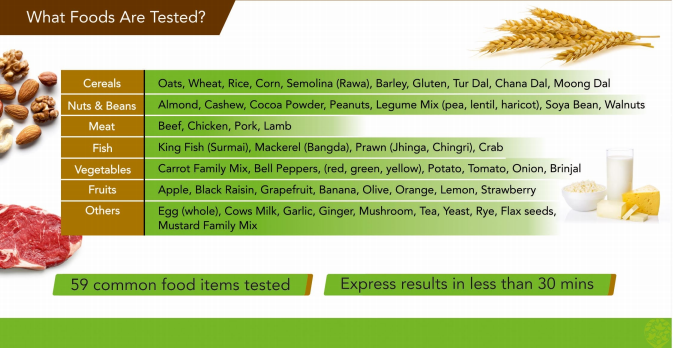Discover Your Allergies And Sensitivities With Health Culture
Find out the reasons behind your unexplained health issues. Understand how your body responds to foods and environmental triggers at Health Culture, where we specialize in allergy and food intolerance tests.
Our expert assistance aims to optimize your diet and overall lifestyle. Thousands have benefited from our food intolerance tests, identifying sensitivities and allergens to elevate their well-being.
Discover a healthier you today – because at Health Culture, understanding your body is the key to cultivating a vibrant and balanced life.
What is Food Intolerance?
Understanding terms like food allergies, intolerance, and hypersensitivity can be confusing. In essence, they all signify abnormal reactions to certain foods. Food hypersensitivity is a broad term encompassing both food intolerances and allergies.
Food intolerance, a non-allergic hypersensitivity, refers to difficulty digesting certain foods, leading to discomfort. While not usually life-threatening, it can result from a lack of specific enzymes or chemicals.
Traditionally, defining intolerance involved trial and error, but at Health Culture, we streamline the process with efficient blood tests. This approach is quicker, more accurate, and provides reliable results for informed dietary adjustments.

Why Should You Test For Food Intolerance?
Testing for food intolerance can be important for several reasons:
Identifying Trigger Foods:
A food intolerance test helps individuals identify specific foods that may be causing adverse reactions or symptoms. This can be particularly useful for people experiencing chronic digestive problems, headaches, fatigue, skin conditions, etc.
Improving Quality of Life:
Discovering and avoiding foods that trigger intolerance can significantly improve one’s quality of life. Continuous exposure to problematic foods can lead to persistent discomfort and negatively impact daily activities.
Preventing Long-term Health Issues:
Untreated food intolerances may contribute to developing more severe health issues over time. You can reduce the risk of long-term complications by early identifying and addressing intolerances with an allergy test in Mumbai.
Customizing Diet Plans:
Knowing which foods to avoid allows individuals to tailor their diet plans to their needs. This personalization can lead to better nutrition and overall well-being.
Managing Chronic Conditions:
For individuals with chronic conditions such as irritable bowel syndrome (IBS) or migraines, identifying and managing food intolerances can be an integral part of symptom management.
Weight Management:
Some people find that addressing food intolerances can help manage weight. Eliminating trigger foods may reduce inflammation and improve digestion, supporting weight loss or maintenance.
Improving Mental Health:
There is a growing body of research suggesting a link between food intolerances and mental health issues such as anxiety and depression. Addressing intolerances with an allergy test in Mumbai may improve mental well-being.
What are the common food intolerance symptoms?

Here are some symptoms that might be linked to food intolerance.
Anxiety (acute or chronic):
While anxiety can have various causes, some individuals report an association between certain foods and heightened anxiety levels. Identifying and addressing potential food sensitivities may contribute to managing stress.
Arthritis:
Some people with arthritis or joint pain report improvement in symptoms when they eliminate certain foods from their diet. However, the relationship between food intolerance and arthritis can vary among individuals.
Asthma:
Certain foods may trigger asthma symptoms in some individuals. Identifying and avoiding these trigger foods can be beneficial for managing asthma.
Bloating:
Bloating is a common symptom of food intolerance, particularly to certain carbohydrates. Individuals with conditions like lactose intolerance or fructose malabsorption may experience bloating after consuming specific foods.
Constipation:
Food intolerances, particularly to certain types of fiber or gluten, can contribute to constipation in some individuals.
Insomnia:
Disruptions in sleep patterns, including insomnia, have been reported by some individuals with food intolerances. Identifying and addressing trigger foods may contribute to better sleep.
Weight Issues:
Food intolerances can sometimes be associated with weight-related problems. This may include unintended weight loss or gain, and addressing intolerances can contribute to achieving and maintaining a healthy weight.
Depression:
There is emerging research suggesting a link between food intolerances and mental health, including depression. Dietary modifications based on intolerance testing or elimination diets may be explored.
Diarrhea:
Diarrhea is a common symptom of various food intolerances, such as lactose intolerance or sensitivity to certain food additives.
Headaches:
Some individuals report experiencing headaches or migraines as a result of food intolerances. Identifying and eliminating trigger foods may help manage these symptoms.
Itchy Skin Problems:
Skin issues like eczema or hives can be associated with specific food intolerances. Eliminating trigger foods may lead to improvements in skin health.
It’s important to note that individual responses to food can vary, and not everyone with these symptoms necessarily has food intolerances.

Find Out The Process Of Food Intolerance Testing
Convenient Home Collection:
Opt for home blood collection for allergy test in Mumbai for added ease. Skilled lab technicians make the process hassle-free and accessible.
Efficient Collection Process:
A skilled technician swiftly collects your blood sample for allergy test in Mumbai for a seamless and efficient experience.
Rapid Results in Less Than 1 Hour:
Get results of allergy test in Mumbai within an hour, ensuring a quick and accurate assessment of food intolerances.
Insightful Reporting:
Detailed reports interpret intolerances, allowing informed dietary choices for a healthier lifestyle.
Innovative Testing:
Using advanced technology, Food Detective is a self-contained test for 59 common Indian food intolerances.
Around 59 Common Food Items are Tested in the Food Intolerance Test.

CEREALS
- OAT (जई)
- WHEAT (गेहूँ)
- RICE (चावल)
- CORN (मक्का)
- SEMOLINA (सूजी)
- BARLEY (जौ)
- RYE (राई)
- FLEX SEED (सन का बीज)
- GLUTEN
NUTS & BEANS
- ALMOND (बादाम)
- CASHEW (काजू)
- WALNUT (अखरोट)
- TEA
- MILK
MEAT
- EGG
- CHICKEN
- LAMB
- PORK
FISH
- KING FISH (SURMAI)
- MACKEREL (BANGDA)
- PRAWN
- CRAB
VEGETABLES
MUSTARD FAMILY(सरसों पिरवार)
- CARROT FAMILY
- POTATO
- TOMATO
- ONION
- BRINJAL (बैंगन)
- PEPPERS (काली िमचर्)
PULSES
- TUR DAL
- CHANA DAL
- MOONG DAL
- LEGUME MIX (फिलयां)
- BANANA
- GOURD MIX
- PEANUTS (मूंगफली)
- SOYA BEAN
- CHOCOLATE
FRUITS
- APPLE
- BLACK RAISIN (काली िकशिमश)
- OLIVE (जैतून)
- LEMON / ORANGE/ GRAPE FRUIT
- STRAWBERRY
- GINGER (अदरक)
- GARLIC (लहसुन)
- MUSHROOM
- YEAST (ख़मीर)
Why Take A Food Intolerance Test from Health Culture?
Here are the top 3 reasons to book us for an allergy test in Mumbai:
Affordable Cost:
At Health Culture, we believe in transparent pricing to ensure affordability. Our food intolerance test price is just Rupees 6000/-.
Convenient Home Collection:
Opt for home blood collection for added ease. Skilled lab technicians make taking an allergy test in Mumbai hassle-free and accessible.
Accurate Results:
Advanced testing methods utilized in our food intolerance test ensure precise identification of trigger foods.
Contact Us Now
Frequently asked questions (FAQ's)
Food Intolerance means either the body cannot properly digest the food that is eaten, or that a particular food might irritate the digestive system.
Food Intolerance happens when your body lacks the enzyme which are used for digestion.
Food intolerance can affect the body through various factors such as dairy products, grains that contain gluten, wheat, yeast, caffeine etc. which causes different food intolerance symptoms.
Some of the common problems found in our body are tiredness & fatigue, stomach pain, skin problem, chronic muscle or joint pain, headache & migraine. These health issues are caused due to food intolerance.
The common symptoms found in food intolerance are Anxiety (acute or chronic), Arthritis, Asthma, Bedwetting, Bloating, Constipation, Insomnia, Weight issues, Depression, Diarrhea, Headaches, Itchy skin problems.
Traditionally, food intolerance was done by trial and error. The symptoms were not always related, which made it difficult to track because you don’t know which diet to eliminate. That’s why at Health Culture, 59 common Indian food items are tested through blood test. The detailed report is provided within 60 minutes and you get faster, accurate and more reliable results.
Yes, blood test are reliable and accurate in comparison to the traditional method of trial & error. At Health Culture, 59 common Indian food items are tested through blood test. Accordingly, you can structure a good diet plan based on the result. Check out our free guide book, there is our sample test report of patient in our free pdf booklet for you.
No. Food intolerance and Food Allergy are two different concepts, though the symptoms may seem a bit similar sometimes, people often confuse intolerance with allergy. Food allergies involve the immune system whereas food intolerances involve the digestive system.
